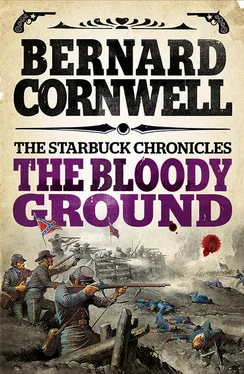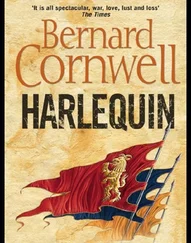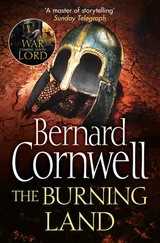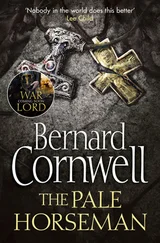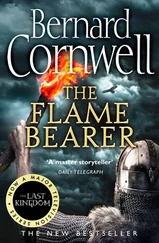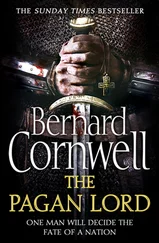“Potter!” Dennison shouted, then stilled his protest as Starbuck half cocked the gun and spun the cylinder a second time.
“Of course a gentleman like you wouldn’t be content with a lady’s first refusal, would you, sir?” Starbuck asked and eased the hammer all the way back once more. It made two tiny clicks as the pawl engaged. He could see that the cone under the hammer was empty, but none of the others around the table knew which of the chambers was primed. They would be able to see the bullets nestled inside the lower chambers, but not the cones at the cylinder’s rear. Starbuck smiled. “So my Emily’s refused you once, Captain,” he said, “but you’d surely ask her a second time, wouldn’t you? I mean you don’t have the manners of a goat, so you’re sure to ask her a second time.” He straightened his arm as though bracing himself for the gun’s recoil.
Cartwright fumbled for his own revolver, but Starbuck pointed the gun momentarily at the frightened face and Cartwright immediately subsided. Starbuck shifted the gun back to Dennison. “Second chance coming up, Captain, sir. Dear Emily, please lay yourself down and play mattress for me. Let’s see how lucky you are the second time of asking, Captain.” He pulled the trigger and once again Dennison shuddered as the dead click echoed loud in the room. Starbuck immediately spun the chamber a third time and straightened his arm.
“You’re mad, Potter,” Dennison said, suddenly seeming very sober.
“I’m sober too,” Starbuck said and reached out with his left hand for Cartwright’s brandy, which he drank in one go. “I’ll be madder still when I’m drunk,” he said, “so how many chances do you reckon you’ve got with my wife, Captain? Are you going to ask her three times for the favor of a ride?”
Dennison considered reaching for his own revolver, but it was buttoned in its holster and he knew he would have no chance to free the weapon before a bullet slashed through the candle flames and shattered his skull. He licked his lips. “I guess I don’t have any chance, Lieutenant,” he said.
“I guess you don’t, Captain,” Starbuck said, “and I guess you owe me an apology too.”
Dennison grimaced at the thought. “You can go to hell, Potter,” he said defiantly.
Starbuck pulled the trigger, then immediately half cocked the gun and spun the cylinder a fourth time. When it came to rest he pulled the cock back and this time he could see the single percussion cap was waiting under the hammer. He smiled. “Three times lucky, Captain, but how good is your luck? I’m waiting for that apology.”
“I apologize, Lieutenant Potter,” Dennison managed to say.
Starbuck eased the hammer down, thrust the Adams into its holster, and stood up. “Never start what you can’t finish, Captain,” he said, then leaned forward and picked up the half full bottle of brandy. “Reckon I can finish this, though, but in privacy. You all have a nice conversation now.” He walked out of the room.
It was a humid, rainy night in Washington with no wind to take away the thick stench of the garbage dump that lay at the southern end of Seventeenth Street just a few yards from the hospital tents pitched on the ellipse. The sewage in Murder Bay added its own fetid smell to the air above the Northern capital that was more than usually crowded with soldiers. They were men who should have been marching in John Pope’s army toward Richmond, but instead they had been whipped backward by Robert Lee from the banks of the Bull Run and now they filled the tented camps inside Washington’s ring of forts and thronged the capital’s taverns.
One young cavalry officer hurried along Pennsylvania Avenue to the corner of Seventeenth Street, where he took off his wide-brimmed cavalryman’s hat to peer up at the street lamp. At every corner in Washington the lamps had their street’s name painted in black on the glass covering the mantel, an intelligent device, and once the young man was sure he was in the right place he walked up Seventeenth until he reached a three-story brick building that was thickly surrounded by trees. Gas lights showed where the building’s narrow end abutted onto the sidewalk and where a flight of steps led to a door guarded by two blue-coated sentries, though when the young cavalryman presented himself at that door he was told to go back to the garden entrance on Pennsylvania Avenue. He retraced his steps and discovered a driveway that led through night-blackened trees to an imposing portico of six massive columns that protected and dwarfed a small doorway guarded by a quartet of blue-coated infantrymen. Gas lamps hissed yellow under the portico, lighting a carriage that waited for its owner.
A clock struck nine as the cavalryman was granted entrance into the hallway where yet another guard demanded his name. “Faulconer,” the young man replied. “Captain Adam Faulconer.” The guard consulted a list, ticked off Adam’s name, then told him to put his scabbarded saber into an umbrella stand and afterward climb one flight of stairs, turn left at the stairhead, and walk to the very end of the corridor where he would find a door marked with the name of the man who had summoned him. The guard rattled off these directions, then went back to his copy of The Evening Star, which heralded Major General George McClellan’s reappointment as commander of the Northern army.
Adam Faulconer mounted the stairs and walked down the long, gloomy corridor. This building was the War Department, the very center of the North’s military effort, yet there was little sense of urgency in its darkened passages where Adam’s footfalls echoed as forlornly as the steps of a man pacing a deserted sepulcher. Most of the fanlights above the office doors were dark, though one light showed at the corridor’s far end and in its small glow Adam saw the name COL. THORNE painted in white letters against one of the door’s black panels. He knocked and was summoned inside.
He found himself in a surprisingly large room with two tall windows that were shut against both the rain and the moths that beat against the panes. The walls of the room were covered with maps, and one large desk stood beside one window, while two smaller clerks’ tables occupied the rest of the room. All the desks were covered in papers that had flowed onto the chairs and hardwood floor. Two cast-iron gasoliers hissed beneath the high ceiling, while a longcase clock ticked hollowly between the windows. The room’s only occupant was a tall uniformed man who stood with a ramrod-straight back as he stared at the scatter of lit windows showing above the trees in the White House. “Faulconer, yes?” the man asked without turning from the window.
“Yes, sir.”
“My name is Thorne. Lyman Thorne. Colonel Lyman Thorne.” Thorne had a coarse, almost angry voice, very deep toned, and when he abruptly turned toward Adam he revealed a face that matched the voice perfectly, for Thorne was a gaunt, white-bearded man with fierce eyes and with deep lines carved into his sun-darkened cheeks. His most prominent feature was his white hair, which grew thick, long, and wildly enough to make Thorne appear like a bearded version of Andrew Jackson. The Colonel carried himself straight and proud, though when he moved he favored his right leg, which suggested that his other might have been injured. He gazed at Adam for an instant, then turned back to the window. “There have been celebrations in Washington these last two days,” he growled.
“Yes, sir.”
“McClellan is back! John Pope is dismissed and the Young Napoleon has been given charge of the army again, and thus Washington celebrates.” Thorne spat into a brass cuspidor, then glared at Adam. “Do you celebrate this appointment, young Faulconer?”
Adam was taken aback by the question. “I haven’t considered it, sir,” he eventually admitted lamely.
Читать дальше
